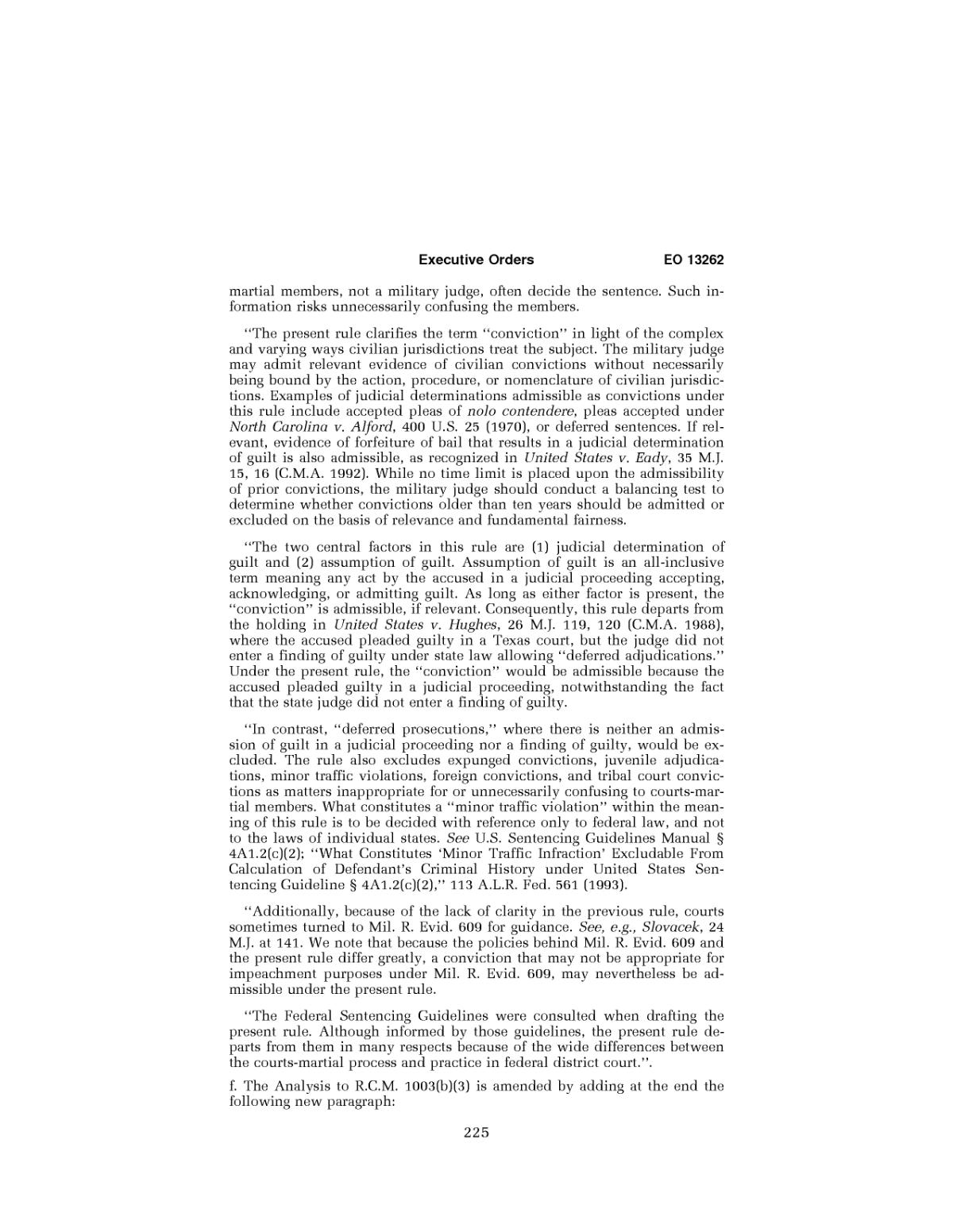Executive Orders EO 13262 martial members, not a military judge, often decide the sentence. Such in- formation risks unnecessarily confusing the members. "The present rule clarifies the term "conviction" in light of the complex and varying ways civilian jurisdictions treat the subject. The military judge may admit relevant evidence of civilian convictions without necessarily being bound by the action, procedure, or nomenclature of civilian jurisdic- tions. Examples of judicial determinations admissible as convictions under this rule include accepted pleas of nolo contendere, pleas accepted under North Carolina v. Alfbrd, 400 U.S. 25 (1970), or deferred sentences. If rel- evant, evidence of forfeiture of bail that results in a judicial determination of guilt is also admissible, as recognized in United States v. Eady, 35 M.J. 15, 16 (C.M.A. 1992). While no time limit is placed upon the admissibility of prior convictions, the military judge should conduct a balancing test to determine whether convictions older than ten years should be admitted or excluded on the basis of relevance and fundamental fairness. "The two central factors in this rule are (1) judicial determination of guilt and (2) assumption of guilt. Assumption of guilt is an all-inclusive term meaning any act by the accused in a judicial proceeding accepting, acknowledging, or admitting guilt. As long as either factor is present, the "conviction" is admissible, if relevant. Consequently, this rule departs from the holding in United States v. Hughes, 26 M.J. 119, 120 (C.M.A. 1988), where the accused pleaded guilty in a Texas court, but the judge did not enter a finding of guilty under state law allowing "deferred adjudications." Under the present rule, the "conviction" would be admissible because the accused pleaded guilty in a judicial proceeding, notwithstanding the fact that the state judge did not enter a finding of guilty. "In contrast, "deferred prosecutions," where there is neither an admis- sion of guilt in a judicial proceeding nor a finding of guilty, would be ex- cluded. The rule also excludes expunged convictions, juvenile adjudica- tions, minor traffic violations, foreign convictions, and tribal court convic- tions as matters inappropriate for or unnecessarily confusing to courts-mar- tial members. What constitutes a "minor traffic violation" within the mean- ing of this rule is to be decided with reference only to federal law, and not to the laws of individual states. See U.S. Sentencing Guidelines Manual \365 4A1.2(c)(2); "What Constitutes 'Minor Traffic Infraction' Excludable From Calculation of Defendant's Criminal History under United States Sen- tencing Guideline \365 4A1.2(c)(2)," 113 A.L.R. Fed. 561 (1993). "Additionally, because of the lack of clarity in the previous rule, courts sometimes turned to Mil. R. Evid. 609 for guidance. See, e.g., Slovacek, 24 M.J. at 141. We note that because the policies behind Mil. R. Evid. 609 and the present rule differ greatly, a conviction that may not be appropriate for impeachment purposes under Mil. R. Evid. 609, may nevertheless be ad- missible under the present rule. "The Federal Sentencing Guidelines were consulted when drafting the present rule. Although informed by those guidelines, the present rule de- parts from them in many respects because of the wide differences between the courts-martial process and practice in federal district court.". f. The Analysis to R.C.M. 1003(b)(3) is amended by adding at the end the following new paragraph: 225
�
